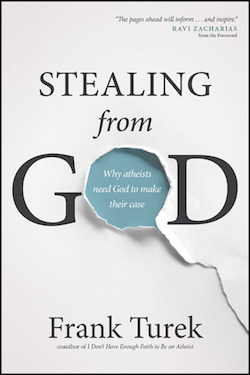This sponsored post was prepared by Dr. Frank Turek.
 What if your best reasons to doubt God show that He actually exists? What if atheists, properly understood, are actually unwitting apologists for the God they reject? That’s exactly what I unpack in my new book Stealing from God: Why atheists need God to make their case.
What if your best reasons to doubt God show that He actually exists? What if atheists, properly understood, are actually unwitting apologists for the God they reject? That’s exactly what I unpack in my new book Stealing from God: Why atheists need God to make their case.
To briefly mention just two examples from the seven in the book, when atheists cite reason and science as providing evidence against God, they are actually stealing from God to argue against Him. That is, reason and science use aspects of reality that wouldn’t exist if atheism were true. Theism can explain them, but atheism cannot.
Atheists claim to be champions of reason. They even organize “reason” rallies and call themselves “free thinkers.” The problem is there is no “free” or thinking going on if atheism is true. If we are just molecules in motion as atheistic materialism asserts, then we are nothing but moist robots whose every thought is the result of the non-rational laws of physics. “Free thinking” can’t exist in such a world. So why should we believe anything the atheist thinks or says, including his thoughts about atheism?
Without an ability to think freely, science is lost too. As C. S. Lewis put it, “Unless human reasoning is valid no science can be true,” which would include the science of prominent atheists, Sam Harris, Lawrence Krauss, Richard Dawkins, and everyone else. Prominent atheist philosopher Thomas Nagel admits this. He writes, “Evolutionary naturalism provides an account of our capacities that undermines their reliability, and in doing so undermines itself.” (That’s why Nagel is personally looking for a more plausible worldview than materialism.)
Atheists try to use immaterial entities—such as the laws of logic and our ability to reason—while claiming nothing immaterial exists. Yet logic and reason are well explained by a theistic God whose very nature is rational—”in the beginning was the Word” (or rationality) as the opening line of John’s gospel declares.
The beginning is also better explained by theism. Atheism cannot account for this fine-tuned universe that burst into existence out of nothing (not a quantum vacuum but literally no-thing). Since space-time and matter had a beginning, then the cause must be beyond space-time and matter. In fact, a spaceless, timeless, immaterial, powerful, and intelligent being seems necessary to create this universe with the exceedingly precise laws and constants it has.
Those fine-tuned natural laws are not only required for the universe to exist, but they are critical to our ability to do science. We couldn’t do science if natural laws weren’t held constant. Why do all physical things change, but not the natural laws that govern them? The best explanation is a rational Law Giver who created and sustains the universe in which we live.
So even if the atheist’s favorite anti-God argument—macroevolution—is true, they still have to rely on God for it. The very process of natural selection requires the existence and persistence of natural laws that are best explained by a Creator and Sustainer.
Now, I’m not saying atheists can’t do science. Obviously they can. What I am saying is that atheists are unwittingly stealing tools from God in order to do science. In fact, since we can do science very well, the atheistic worldview must be false. Thus, the war is not between science and religion, but between science and atheism.
The bottom line is that atheism cannot be shown to be true in principle. It has destroyed all the tools necessary to do the job. In order to construct any valid argument for atheism, the atheist has to steal tools from God’s universe because no such tools exist in the world of atheism. Atheists must steal from the very Being who makes reason and science possible in the first place.
Click to learn more about Stealing From God.











